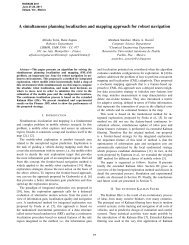Understanding the Software Options
Understanding the Software Options
Understanding the Software Options
You also want an ePaper? Increase the reach of your titles
YUMPU automatically turns print PDFs into web optimized ePapers that Google loves.
Solids Environmental Processing Manager<br />
Practice Green<br />
Chemical Engineering<br />
Chemical engineers have countless opportunities<br />
to apply <strong>the</strong>ir talents to environmentally related improvements,<br />
specifically in R&D, plant design and operations<br />
C. Delia Contreras<br />
and Fabio Bravo<br />
Specialists in plant design<br />
and operation<br />
Almost by definition, chemical engineering<br />
is a “green” discipline<br />
today, as it so often involves efforts<br />
to optimize chemical processes<br />
in order to reduce <strong>the</strong> amount of<br />
energy and raw materials that are used<br />
and <strong>the</strong> amount of waste that is generated.<br />
Today everybody “talks green” but<br />
in a lot of cases engineers are <strong>the</strong> most<br />
qualified people to provide <strong>the</strong> tools required<br />
to make complex chemical processes<br />
more environmentally sustainable.<br />
In fact, many types of engineers — but<br />
chemical engineers, in particular — are<br />
in an ideal position to develop solutions<br />
for some of today’s most important problems,<br />
including all types of air pollution,<br />
CO 2 emissions, carbon capture and storage,<br />
improved renewable energy sources,<br />
improved food production, sustainable<br />
water supply and wastewater treatment,<br />
quick and economic mass production of<br />
vaccines and drugs, complex issues related<br />
to global warming 1 and so on.<br />
1. It is understood that <strong>the</strong> concept of global<br />
warming is not universally accepted and this<br />
article does not intend to address ei<strong>the</strong>r side of<br />
that argument.<br />
If not properly addressed, <strong>the</strong>se issues<br />
will become even more critical, as<br />
economic growth and demographic expansion<br />
invariably leads to increased<br />
consumption of fuel and natural<br />
resources and to increased production<br />
of waste streams. “Being green”<br />
has always been part of <strong>the</strong><br />
chemical engineering profession —<br />
although in <strong>the</strong> past, such activities<br />
were not necessarily called green<br />
or sustainable.<br />
So-called “green practices” are often<br />
considered to be expensive or unaffordable,<br />
prompting some process<br />
operators to do just what is required<br />
to comply with <strong>the</strong> minimum legal<br />
requirements. This type of thinking<br />
is not only outdated but shortsighted,<br />
as well. Today, it is increasingly recognized<br />
that green practices and<br />
economic profits are related. Technically<br />
strong and innovative teams are<br />
needed to capitalize on <strong>the</strong> opportunities<br />
to link environmentally related<br />
activities with bottom-line profitability.<br />
Today, it’s widely recognized that<br />
improvements such as reduction of energy<br />
and raw material consumption,<br />
minimization of waste production and<br />
increased process yields are critical to<br />
increase a facility’s overall economic<br />
profitability. There are tremendous<br />
opportunities for technically strong<br />
and innovative chemical engineers to<br />
bring <strong>the</strong>ir expertise and ingenuity to<br />
bear in green endeavors, in chemical<br />
engineering roles ranging from R&D<br />
to process design and operation. A<br />
key driver for becoming greener has<br />
to do with <strong>the</strong> so-called “three key<br />
Ps”: planet, people and profits. This<br />
article discusses some of <strong>the</strong> opportunities<br />
that are available for chemical<br />
engineers to lead <strong>the</strong> charge in<br />
green engineering.<br />
Why green?<br />
Being green is about taking care of <strong>the</strong><br />
planet, which is in <strong>the</strong> best interest of<br />
every person regardless of profession.<br />
But, considering <strong>the</strong> special training<br />
that chemical engineers receive, it is<br />
especially applicable to members of<br />
our profession. Today, no company has<br />
much choice when it comes to taking<br />
care of <strong>the</strong> environment or investigating<br />
ways to operate in a more environmentally<br />
sustainable way.<br />
It is not only a matter of compliance<br />
with regulations but a matter of responding<br />
to <strong>the</strong> demands and expectations<br />
of customers, employees, com-<br />
CHEMICAL ENGINEERING WWW.CHE.COM AUGUST 2011 41
















